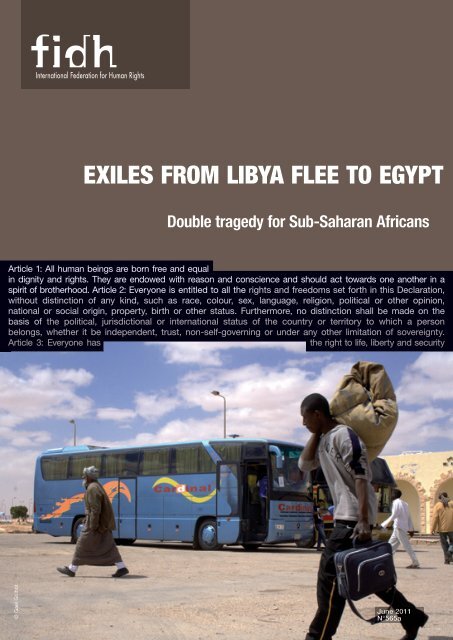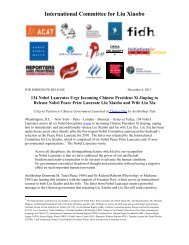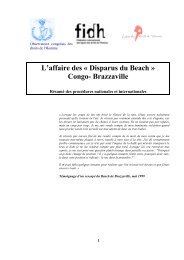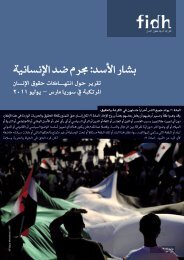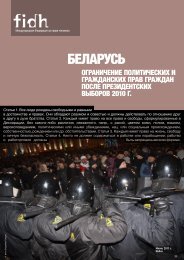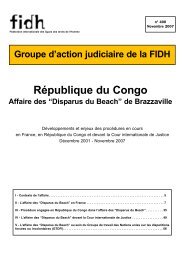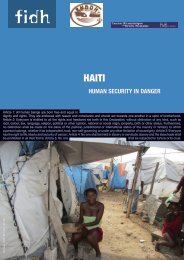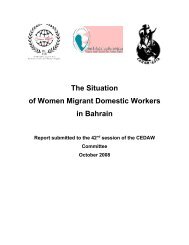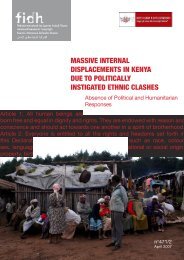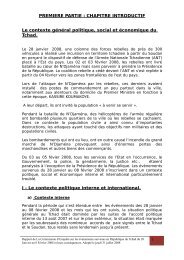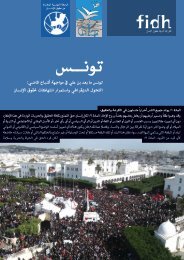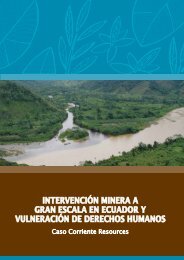You also want an ePaper? Increase the reach of your titles
YUMPU automatically turns print PDFs into web optimized ePapers that Google loves.
EXILES FROM LIBYA FLEE TO EGYPTDouble tragedy for Sub-Saharan AfricansArticle 1: All human beings are born free and equalin dignity and rights. They are endowed with reason and conscience and should act <strong>to</strong>wards one another in aspirit of brotherhood. Article 2: Everyone is entitled <strong>to</strong> all the rights and freedoms set forth in this Declaration,without distinction of any kind, such as race, colour, sex, language, religion, political or other opinion,national or social origin, property, birth or other status. Furthermore, no distinction shall be made on thebasis of the political, jurisdictional or international status of the country or terri<strong>to</strong>ry <strong>to</strong> which a personbelongs, whether it be independent, trust, non-self-governing or under any other limitation of sovereignty.Article 3: Everyone hasthe right <strong>to</strong> life, liberty and security© Gael GrilhotJune 2011N°565a
2 / Titre du rapport – <strong>FIDH</strong>
I. Introduction------------------------------------------------------------------------------------- 4II. INSECURITY AND EMERGENCY AT THE BORDER -------------------------------------- 7III. VIOLENCE TARGETING SUB-SAHARAN AFRICANS IN LIBYA ------------------- 12IV. Key recommendations ------------------------------------------------------------------- 19Appendix: Interview summaries---------------------------------------------------------- 20<strong>FIDH</strong> would like <strong>to</strong> thank all those met by the mission. <strong>FIDH</strong> extends particular thanks <strong>to</strong> Africa and Middle East RefugeeAssistance (AMERA) and the African Centre for Justice and Peace Studies, for assistance in organising the mission.<strong>FIDH</strong> – EXILES FROM LIBYA FLEE TO EGYPT / 3
I. INTRODUCTION1. Hundreds of thousands of migrant workers and refugees <strong>flee</strong> <strong>Libya</strong>The conflict that began in <strong>Libya</strong> on 17 February 2011 with a popular revolt against the regimeof Colonel Gaddafi, following the Tunisian and <strong>Egypt</strong>ian revolutions in January, triggered amass exodus of the civilian population in<strong>to</strong> neighboring countries. The violence perpetrated byGaddafi’s security forces against civilians, the conflict led by rebel groups controlling eastern<strong>Libya</strong> <strong>to</strong> overthrow the regime and NATO bombings have caused thousands of deaths andinjuries and forced hundreds of thousands of people <strong>to</strong> <strong>flee</strong> the country. In addition, as detailedin this report, violence specifically targeting immigrants <strong>from</strong> Sub-Saharan Africa has forcedthousands of migrant workers and refugees <strong>to</strong> <strong>flee</strong> <strong>Libya</strong>.According <strong>to</strong> figures <strong>from</strong> the International Organization for Migration (IOM) dated 20 June2011, more than 1.1 million people have fled <strong>Libya</strong> since late February, mostly over land borderswith Tunisia and <strong>Egypt</strong>. Of those only about 19,000 exiles have tried <strong>to</strong> escape by sea, arrivingin Lampedusa and Malta between 26 March and 14 June 2011, representing 1.7% of the exodus<strong>from</strong> <strong>Libya</strong>. Fantasies of “invasion” voiced in Europe have therefore no basis in reality, buthave nonetheless been used <strong>to</strong> justify extraordinary surveillance measures at sea aiming <strong>to</strong>prevent the arrival of migrants and refugees in<strong>to</strong> European terri<strong>to</strong>ry. The multiplication of thesebarriers has had dramatic consequences – as of 14 June the UNHCR estimates that over 2,000people have drowned while <strong>flee</strong>ing <strong>Libya</strong> since February - and contributes <strong>to</strong> violations of theright <strong>to</strong> seek refuge abroad.See www.iom.intThe vast majority of those <strong>flee</strong>ing <strong>Libya</strong> between February and June were immigrants workingin <strong>Libya</strong>: over 500,000 persons originating <strong>from</strong> <strong>Egypt</strong>, Tunisia, Asia (Bangladesh, Pakistanand China) and numerous Sub-Saharan African countries.<strong>Libya</strong>, with its vast oil reserves and small population (approximately 6.4 million), resortedmassively <strong>to</strong> foreign labor <strong>to</strong> run its economy: a figure of 1.5 million migrant workers beforethe start of the conflict is most commonly cited, but other estimates are around 2.5 million(including about 1 million <strong>Egypt</strong>ians).4 / EXILES FROM LIBYA FLEE TO EGYPT – <strong>FIDH</strong>
2. Severe violations of the rights of migrants and refugees in <strong>Libya</strong> beforethe conflictPrior <strong>to</strong> the recent rebellion, migrants arriving in or transiting through <strong>Libya</strong> were regularlyvictims of serious human rights violations, including physical violence, arbitrary arrests anddetention and forced returns. Migrants in an irregular situation were often arrested and detainedin camps, in terrible conditions, sometimes for many years. Others were expelled <strong>from</strong> <strong>Libya</strong>,in violation of international law and the principle of non-refoulement.<strong>Libya</strong> has never ratified the UN Convention on the Status of Refugees of 1951 and does nothave a system guaranteeing the right <strong>to</strong> asylum. Registration of asylum seekers, documentationactivities and refugee status determination procedures were carried out by the UNHCR untilJune 2010, when the body was expelled by the <strong>Libya</strong>n government without explanation.This coincided with the beginning of negotiations between <strong>Libya</strong> and the European Unionon the conditions and amount of an assistance fund <strong>to</strong> be granted <strong>to</strong> <strong>Libya</strong> for the purpose offighting irregular migration 1 . This policy, under which the EU made Gaddafi a partner in fightingirregular migration in<strong>to</strong> Europe and ignored the grave human rights violations committed againstmigrants in <strong>Libya</strong>, formed part of the EU’s general policy of externalising border controls 2 .3. Allowed across the <strong>Libya</strong>n border only <strong>to</strong> remain in transitThe geography of <strong>Libya</strong>, vast expanses of desert with populated areas located mainly alongthe Mediterranean, explains the fact that the exodus has been concentrated at the Tunisian and<strong>Egypt</strong>ian borders (about 582,812 and 358,088 entries in Tunisia and in <strong>Egypt</strong> respectively sincethe conflict began as of 20 June 2011), while smaller numbers have fled across the southernborders with Chad and Niger. 3The <strong>Egypt</strong>ian and Tunisian governments have maintained their borders open <strong>to</strong> those <strong>flee</strong>ing<strong>Libya</strong>. But for most migrants admission in<strong>to</strong> the country does not mean the right <strong>to</strong> stay. Withthe exception of those with <strong>Libya</strong>n nationality, who until now have been allowed <strong>to</strong> settletemporarily in Tunisia and <strong>Egypt</strong>, nationals of other countries are kept in border areas pendingevacuation <strong>to</strong> their countries of origin or - for refugees who cannot return home - resettlementin host countries. The IOM and the UNHCR are responsible for coordinating humanitarianassistance in border areas and organizing departures.4. <strong>FIDH</strong>’s fact-finding mission at the <strong>Egypt</strong>ian-<strong>Libya</strong>n borderAlerted by information on the precarious situation of refugees and migrants stranded at the<strong>Egypt</strong>ian/ <strong>Libya</strong>n border at Salloum and by reports of acts of violence specifically targetingimmigrants <strong>from</strong> Sub-Saharan Africa in <strong>Libya</strong>, <strong>FIDH</strong> sent a fact-finding mission <strong>to</strong> the borderwith two main objectives:• To document the situation of the exiles at the border;• To collect direct testimony <strong>from</strong> exiles on their experiences in <strong>Libya</strong> since the outse<strong>to</strong>f the conflict.1. The National Indicative Programme for <strong>Libya</strong> 2011-2013 negotiated between the EU and <strong>Libya</strong>, includes the fight against illegalmigration as one of its three priorities. The budget proposed by the EU for the programme was 60 million euros.2. See further <strong>FIDH</strong> and UFTDU press statement (in French), Libye/UE : La <strong>FIDH</strong> et l’UFTDU condamnent les propos racistes du ColonelKhadafi, 30 septembre 2010, http://www.fidh.org/Libye-UE-La-<strong>FIDH</strong>-et-l-UFTDU-condamnent-les-propos3. See IOM situation reports http://www.iom.int/jahia/Jahia/lang/fr/pid/1.<strong>FIDH</strong> – EXILES FROM LIBYA FLEE TO EGYPT / 5
Following a mission organized by CIMADE at the Tunisian-<strong>Libya</strong>n border in early April, 4 the<strong>FIDH</strong> mission <strong>to</strong>ok place <strong>from</strong> 8-14 May 2011, including three days at the Salloum border.The mission delegation was composed of Geneviève Jacques, member of <strong>FIDH</strong>’s InternationalBoard and former Secretary General of CIMADE, who also participated in the mission <strong>to</strong>Tunisia, Mohamed Badawi, a Sudanese lawyer <strong>from</strong> Darfur and deputy direc<strong>to</strong>r of the Sudaneseorganization, African Centre for Justice and Peace Studies, and Christine Tadros, Refugee StatusDetermination Team Leader at the refugee aid organization, Africa and Middle East RefugeeAsssistance (AMERA), based in Cairo. The team was accompanied by a freelance journalist,Gael Grilhot.In Cairo, the mission delegation met with officials <strong>from</strong> the IOM (Enrico Ponziani and RehamHussein) and UNHCR (Mohamed Al Dayri and Mark Fawe) who provided information on thework done by the organizations since the outbreak of the <strong>Libya</strong>n crisis. The mission also metwith Jason Bellanger, representative in <strong>Egypt</strong> of the Catholic Relief Service, one of the NGOsproviding humanitarian aid at the border until the end of April and with Nancy Baron, Direc<strong>to</strong>rof the Psycho-Social Training Institute in Cairo and professor at the American University Centerfor Migration and Refugees Studies in Cairo, who had worked for several weeks <strong>to</strong> providesocial support <strong>to</strong> exiles at the Salloum border. A meeting with the Direc<strong>to</strong>r of a human rightsorganization in <strong>Egypt</strong>, the <strong>Egypt</strong>ian Initiative for Personal Rights, Hossam Bahgat, addressedthe wider challenges facing <strong>Egypt</strong> during this period of political transition.At the Salloum border post, the mission met with UNHCR representative, Jean Paul Cavalieriand the Team Leader for Refugee Status Determination procedures, Nazneen Farooqi. Themission also met with several IOM representatives.The delegation encountered no difficulties exchanging with male migrants at the Salloum LandPort, addressed spontaneously and randomly on the site. It was more difficult <strong>to</strong> exchangewith the few women migrants present in Salloum. They were gathered separately in a cus<strong>to</strong>mshangar and on two occasions male migrants prevented the delegation <strong>from</strong> talking <strong>to</strong> the women,claiming that they “would speak only <strong>to</strong> United Nations personnel.” In <strong>to</strong>tal, the delegationconducted more than 50 individual interviews and 4 group interviews at the Salloum Land Port,with migrants originating <strong>from</strong> 12 different countries. The delegation also met with severalmigrants of Palestinian origin in a no man’s land between the <strong>Egypt</strong>ian and <strong>Libya</strong>n bordercontrols.On 8 May, the <strong>to</strong>tal population on the site was 1,401 individuals, of which 609 had beenregistered by the UNHCR as asylum seekers and refugees.4. See press release and CIMADE report at www.lacimade.org.6 / EXILES FROM LIBYA FLEE TO EGYPT – <strong>FIDH</strong>
II. INSECURITY ANDEMERGENCY AT THEBORDER© Gael Grilhot1. Deplorable living conditionsThe scene upon arrival at the cus<strong>to</strong>ms area of the Salloum Land Port is striking: in a desertenvironment swept by winds of dust and sand, the <strong>Egypt</strong>ian cus<strong>to</strong>ms buildings, sheds, awningsof unloading trucks and car parks are full of men, as well as several women and children, sittingor lying on the floor on cardboard or blankets, with their luggage stacked behind them. In somecorners, tarpaulins are attached <strong>to</strong> the fences, forming makeshift tents: those who have been atthe border for some weeks have improvised makeshift shelters <strong>to</strong> avoid sleeping outside. Thesite gives an impression of chaos, anguish and filth. Some of the exiles met by the missiondelegation <strong>to</strong>ld of their anxiety waiting in these conditions: “this is not a place <strong>to</strong> live, we arehuman beings!”And yet, as the delegate <strong>from</strong> the Catholic Relief Service (CRS) reported, the situation hasimproved considerably since the first arrivals at the end of February. In March, there were up<strong>to</strong> 6,000 or 7,000 people, forced <strong>to</strong> sleep outside despite the harsh climatic conditions and therewas insufficient food and water. For a while, the nearby small <strong>to</strong>wn of Salloum offered meals<strong>to</strong> the exiles, as well as plastic sheeting. Today, water supplies and food are now providedby various organisations including the UNHCR, the <strong>Egypt</strong>ian Red Crescent and World FoodProgramme. From the beginning, the <strong>Egypt</strong>ian Ministry of Health has provided ambulances andmedical personnel.However, unlike in Tunisia, there is no “camp” in Salloum because the <strong>Egypt</strong>ian authoritiesrefused <strong>to</strong> allow any permanent installation on their terri<strong>to</strong>ry, even in the form of tents. It is ageneral and longstanding policy in <strong>Egypt</strong> (the “no encampment policy”), which has remained inforce in the face of the exodus <strong>from</strong> <strong>Libya</strong>. Nevertheless, at the time of the <strong>FIDH</strong> mission, therewas a plan <strong>to</strong> construct serveral large tents (“rubber halls”). Tubular structures were already inplace, but permission <strong>to</strong> complete their construction had not yet been granted, evidence of thereluctance of the <strong>Egypt</strong>ian authorities <strong>to</strong> allow refugees <strong>to</strong> settle in this place. The rubber hallswere finally completed on 18 May.<strong>FIDH</strong> – EXILES FROM LIBYA FLEE TO EGYPT / 7
© Gael GrilhotIn this context, with minimal sanitation facilities, the living conditions of exiles on the <strong>Egypt</strong>ianborder are degrading and disrespectful of human dignity. But - although desired by all – it is noteasy for people <strong>to</strong> leave :• Settling in <strong>Egypt</strong> is not an option: the <strong>Egypt</strong>ian government has made this clear <strong>from</strong>the beginning. The border remains open on the condition that exiles are evacuatedquickly;• Migrants who can and want <strong>to</strong> return <strong>to</strong> their country of origin are registered by theIOM and wait for group flights <strong>to</strong> be organised <strong>to</strong> take them home;• Those who had fled <strong>to</strong> <strong>Libya</strong> <strong>to</strong> escape persecution at home and who therefore cannotreturn <strong>to</strong> their country of origin are registered by the UNHCR, which conducts interviewsfor determination of refugee status and then looks for resettlement countries.The procedures are not the same for everyone and, consequently, the time it takes <strong>to</strong> find asustainable solution for each individual varies <strong>from</strong> a few days or weeks for migrants, <strong>to</strong> severalmonths for refugees.For the dignity of everyone, and especially for those who will wait for months in Salloum, it isurgent and essential that living conditions are improved.2. For migrants, a solution - repatriationForeigners who do not qualify for UNHCR protection and who are not <strong>Libya</strong>n (the UnitedNations calls them “Third Country Nationals”) are offered repatriation by the IOM as soon aspossible <strong>to</strong> their country of origin, far <strong>from</strong> Salloum and far <strong>from</strong> <strong>Libya</strong>, where they have livedthrough difficult and sometimes dramatic experiences.According <strong>to</strong> recent statistics, the IOM evacuated 34,791 people <strong>from</strong> the <strong>Egypt</strong>ian-<strong>Libya</strong>nborder between 26 February and 16 May. The largest groups were <strong>from</strong> Bangladesh, Chad andNiger. In early May, most of the migrants on the site were Chadian.Upon arrival at the <strong>Egypt</strong>ian border, migrants are required <strong>to</strong> register with the IOM. As manyof these migrants do not have, or no longer have, a passport, embassy representatives come<strong>to</strong> the site <strong>to</strong> identify them and provide them with passes. This poses problems for those whocome <strong>from</strong> countries without representation in <strong>Egypt</strong>, as described by a young Cape Verdeanmet by the delegation, who had been waiting for almost two months <strong>to</strong> meet with an embassyrepresentative in order <strong>to</strong> obtain a pass <strong>to</strong> return.Large groups are then taken by bus <strong>to</strong> airports (Marsa Matruh or Cairo), where flights charteredby the IOM repatriate them <strong>to</strong> the capital of their country. At the time of the <strong>FIDH</strong> mission agroup of more than 300 Chadians were preparing for departure and rows of buses were ready<strong>to</strong> take them <strong>to</strong> Cairo airport (over 7 hours drive). For smaller groups, fewer seats are reservedin regular airliners.8 / EXILES FROM LIBYA FLEE TO EGYPT – <strong>FIDH</strong>
The IOM’s objective, as stressed by the manager met by the delegation, is <strong>to</strong> speed up repatriationso that migrants do not stay more than 5 or 6 days in Salloum. However, this depends on thefunds available <strong>to</strong> the organization <strong>from</strong> international donors. The concern is that the internationalcommunity will lose interest in these migrants, and “forget” this inhospitable border post, wherethe IOM is planning <strong>to</strong> reduce staff if the number of new arrivals continues <strong>to</strong> decline.According <strong>to</strong> those met by the delegation, it is impossible <strong>to</strong> know how many immigrantsare still in <strong>Libya</strong> and could potentially arrive at the border. According <strong>to</strong> a UNHCR official,on 9 May, there were more than 200 immigrants stranded in Misrata awaiting evacuation<strong>to</strong> Benghazi and then <strong>to</strong> the <strong>Egypt</strong>ian border. How many more? A member of the ChadianConsulate in Benghazi, met at the border, estimates that there were approximately 500,000Chadians working in <strong>Libya</strong> before the conflict, only 400,000 of which have returned <strong>to</strong> Chad,so there are still some 100,000 Chadians in <strong>Libya</strong>.© Gael Grilhot3. For refugees, an anxious wait before departure <strong>to</strong> a new exileAmong the hundreds of thousands of foreigners working in <strong>Libya</strong> at time of the onset of theconflict were several thousand people who had gone <strong>to</strong> <strong>Libya</strong> <strong>to</strong> <strong>flee</strong> wars, internal conflictsor fear of persecution in their home countries (including, for example, Sudanese <strong>from</strong> Darfur,Eritreans, Ethiopians Oromos and Somalis). Some had sought and been granted refugee statusby the UNHCR in <strong>Libya</strong> (before the UNHCR was expelled by Gaddafi’s government in June2010). All are now obliged <strong>to</strong> apply for refugee status since there is no possibility of returning<strong>to</strong> their country of origin.According <strong>to</strong> the UNHCR website, the number of people registered with the UNHCR in Salluomwas 609 on 8 May. (On the day the mission delegation left a UNHCR official said that 30 newpeople had arrived who had not yet been registered).By nationality:• Sudan : 340• Eritrea : 105• Ethiopia : 76• Somalia : 68• Chad : 9• Iraq : 6• Democratic Republic of Congo : 2• Ghana : 1• Liberia : 1The UNHCR has deployed teams of professionals, recruited for periods of several weeks <strong>from</strong> theirposts in other parts of the world. These teams are responsible for all the procedures leading <strong>to</strong> therecognition of refugee status under the 1951 Convention on Refugees and the African Union ConventionGoverning the Specific Aspects of Refugee Problems in Africa of 1969 and for finding places forresettlement in third countries. At the time of the mission, the UNHCR team was composed of:- 3 officers and a supervisor for the determination procedure<strong>FIDH</strong> – EXILES FROM LIBYA FLEE TO EGYPT / 9
----3 officers and a supervisor for procedures pertaining <strong>to</strong> resettlement in third countries2 protection officers3 or 4 interpreters1 coordina<strong>to</strong>rInterviews are conducted by officers in small rooms in the administrative buildings at a rateof 6 per day, 5 days per week. Recommendations for acceptance or rejection are sent <strong>to</strong> thesupervisor for a decision. If rejected at first instance, applicants are provided with an oralexplanation of the reasons for refusal and are au<strong>to</strong>matically given an appeal interview withinone week. Another officer is in charge of the second appeal hearing and the coordina<strong>to</strong>r takesthe final decision.As of 10 May, 218 people (out of 609) had undergone the Refugee Status Determinationprocedure, with a recognition rate of 78%.Once recognized as refugees, individuals meet the officers in charge of resettlement, and thewait may be much longer before being accepted in<strong>to</strong> a host country.As of the beginning of June 2011, Sweden had provided 150 spaces: a Swedish mission was onsite <strong>to</strong> review applications. Departures were scheduled for mid-June.The United States of America had pledged <strong>to</strong> take 200 refugees. A mission was scheduled <strong>to</strong>arrive soon for interviews, but the security screening procedures are very long for the UnitedStates, approximately 6 months. UNHCR is negotiating for these refugees, pending a finaldecision of the United States, <strong>to</strong> be transferred <strong>to</strong> a transit shelter in Timisoara, Romania.UNHCR teams reported being subjected <strong>to</strong> dual pressure:• The <strong>Egypt</strong>ian authorities insist that departures speed up and that the Salloum Land Portis not transformed in<strong>to</strong> a refugee camp;• Asylum seekers who have just gone through a second traumatic experience in <strong>Libya</strong>,following the experiences which caused them <strong>to</strong> <strong>flee</strong> in their home countries, areparticularly anxious about their fate, not <strong>to</strong> mention the deplorable living conditionsat Salloum.It is the responsibility of states in the North, and particularly all those who have committed <strong>to</strong>NATO’s military operations “<strong>to</strong> protect civilians” under United Nations Resolution 1973, <strong>to</strong>protect these other civilian victims of the <strong>Libya</strong>n conflict, who are living in precarious conditionsat the <strong>Libya</strong>n border. Concretely, this requires new and more generous funding for operations ofrepatriation of migrants, as well as offers <strong>to</strong> host refugees (a little over 3,000 people, includingrefugees at the borders in <strong>Egypt</strong> and Tunisia).4. Palestinians kept in no man’s landDuring the reign of President Hosni Mubarak, the entry of Palestinians on <strong>Egypt</strong>ian terri<strong>to</strong>rywas strictly limited. In fact, according <strong>to</strong> the Palestinians met in Salloum, it was impossible forPalestinian residents in <strong>Libya</strong> <strong>to</strong> pass the land border; one man had tried 8 times over 30 yearsbut had been turned back at every attempt.These strict controls persist and Palestinians are not allowed <strong>to</strong> enter <strong>Egypt</strong>: they must wait inno man’s land before being transported directly <strong>to</strong> the Gaza border.But, since the fall of Mubarak, it is possible <strong>to</strong> obtain permits <strong>to</strong> enter Palestine by the Rafahcrossing in southern Gaza. To obtain these permits allowing passage through <strong>Egypt</strong>, applicantsmust first contact by phone the representation of the Palestinian Authority in Cairo and provide10 / EXILES FROM LIBYA FLEE TO EGYPT – <strong>FIDH</strong>
personal information, then they are sent <strong>to</strong> the <strong>Egypt</strong>ian authorities, who conduct a screeningprocess. Once the process is complete, Palestinians are allowed <strong>to</strong> cross the border in busesescorted by UNHCR, which funds the trip, and are driven <strong>to</strong> the border with Gaza.Hence the surreal situation of persons staying for several days in the open, barely shelteredunder some blankets serving as tents, in the desert no man’s land separating the borders of<strong>Libya</strong> and <strong>Egypt</strong>.A <strong>to</strong>tal of 200 Palestinians have followed this procedure since the end of January and 34 wereawaiting their turn at the time of the <strong>FIDH</strong> mission. Most of the Palestinians interviewed saidthat they planned <strong>to</strong> return <strong>to</strong> <strong>Libya</strong>.5. Transitional homes for <strong>Libya</strong>ns in <strong>Egypt</strong>Thus far, <strong>Libya</strong>ns have been able <strong>to</strong> enter <strong>Egypt</strong> without a visa. However, at the time of the<strong>FIDH</strong> mission, panic was rising since the <strong>Egypt</strong>ian authorities had decided on 7 May that<strong>Libya</strong>ns should obtain visas <strong>from</strong> <strong>Egypt</strong>ian Consulate in Benghazi. Following protests andchaos generated at the border by this sudden move, this decision was lifted after two daysand <strong>Libya</strong>ns could again move freely across the border. Traffic is heavy in both directions,especially for commercial purposes.According <strong>to</strong> the <strong>Egypt</strong>ian authorities of Marsa Matruh, some 95,000 <strong>Libya</strong>ns have come <strong>to</strong><strong>Egypt</strong> since February 2011 and 35,000 have returned <strong>to</strong> <strong>Libya</strong> (although the precise numbersare difficult <strong>to</strong> estimate). This would mean that, as of June 2011, about 60,000 <strong>Libya</strong>ns are stillin <strong>Egypt</strong>, spread over the entire northern coast of the country, <strong>from</strong> Salloum <strong>to</strong> Alexandria. Thevast majority of these families rent apartments in residential complexes along the sea that arenot occupied during the winter season. Problems are likely <strong>to</strong> arise, the mission delegation was<strong>to</strong>ld, when the <strong>to</strong>urist season starts and owners want <strong>to</strong> reclaim their homes.Some families in need, mainly senior persons accompanying small children, have benefited<strong>from</strong> the solidarity of local people and <strong>from</strong> the help offered by a charity headed by the Sheikhof Marsa Matruh.A UNHCR mission was mandated <strong>to</strong> investigate the needs of <strong>Libya</strong>ns in this precarious situationin the region of Marsa Matruh <strong>from</strong> 2-4 May and recommended that funds be allocated foremergency aid for food and basic supplies through the <strong>Egypt</strong>ian Red Crescent.© Gael Grilhot<strong>FIDH</strong> – EXILES FROM LIBYA FLEE TO EGYPT / 11
III. VIOLENCETARGETING SUB-SAHARAN AFRICANSIN LIBYAThe <strong>FIDH</strong> mission gathered extensive consistent and alarming reports about violence andother grave human rights violations targeting migrants <strong>from</strong> Sub-Saharan Africa in <strong>Libya</strong>,because of the colour of their skin.These conclusions are based on the experiences reported by exiles interviewed by the <strong>FIDH</strong>delegation between 10-12 May at the Salloum border post. Interviewees were, in most cases,either direct victims of, or witnesses <strong>to</strong>, violence. Almost all of those who spoke <strong>to</strong> the missiondelegation had been living in the Eastern part of <strong>Libya</strong>, which is under the control of theopposition. The abuses reported are alleged <strong>to</strong> have been perpetrated by armed <strong>Libya</strong>n men,operating in Benghazi and other areas now under the responsibility of the Interim NationalCouncil of <strong>Libya</strong>. The mission did not meet with migrants <strong>flee</strong>ing <strong>from</strong> Tripoli or other parts ofWestern <strong>Libya</strong> (the majority of whom <strong>flee</strong> through Tunisia).The mission delegates, after explaining that they were <strong>from</strong> a human rights organization,asked each individual approached if they were willing <strong>to</strong> describe what happened <strong>to</strong> them in<strong>Libya</strong> before the start of conflict and since the outbreak of hostilities in mid-February. Thoseinterviewed were very willing <strong>to</strong> talk about their traumatic experiences in <strong>Libya</strong>. All the moreso, since they had never been asked about it. Interest was so high that interviews that beganwith one person sometimes ended with a small group with other exiled people spontaneouslyintervening <strong>to</strong> tell their own s<strong>to</strong>ry.In <strong>to</strong>tal, the mission conducted more than 50 individual interviews and collected information<strong>from</strong> 4 groups of exiles of the following nationalities:• Sudan : 17 individuals (15 of whom originated <strong>from</strong> Darfur) and 2 groups• Chad : 8 individuals and 2 groups• Eritrea : 7• Somalia : 6• Nigeria : 4• Ethiopia (<strong>from</strong> the Oromo region) : 3• Liberia : 1• Cape Verde : 1• Democratic Republic of Congo (DRC) : 1• India : 1• Palestinians (in no man’s land between the <strong>Egypt</strong>ian and <strong>Libya</strong>n borders) : 4The nationalities most represented in this sample, Sudanese and Chadians, reflect those mostpresent in Salloum at the time of the mission.Interviewees were mostly single men, between 20 and 40 years old, who had been working forseveral years in <strong>Libya</strong> in various kinds of jobs, <strong>from</strong> farm workers <strong>to</strong> doc<strong>to</strong>rs or traders. Mos<strong>to</strong>f them lived in Benghazi, with some <strong>from</strong> Tobruk, Aldjabia or Misrata. The time spent at theSalloum border varied widely between 2 months and 2 days.12 / EXILES FROM LIBYA FLEE TO EGYPT – <strong>FIDH</strong>
Most had come <strong>to</strong> <strong>Libya</strong> <strong>to</strong> find work, make a living and send money <strong>to</strong> their families backhome.All Sub-Saharan Africans testified that they had taken the decision <strong>to</strong> leave their jobs and <strong>flee</strong><strong>Libya</strong> because they could no longer live in hostility and fear of violence they had experiencedpersonally as black Africans, having become targets of violent abuse since the outbreak ofrebellion.The different types of abuse reported by those interviewed are presented below, illustrated bya few significant testimonies transcribed by members of the delegation. A table in the appendix<strong>to</strong> this report summarises all violations reported by each respondent.© Gael Grilhot1. Discrimination and social exclusion before the conflictFew of those interviewed focused on their experience in <strong>Libya</strong> before the outset of the conflictin February 2011.A young Cape Verdean man expressed simply what others mentioned in passing, namely “wewere discriminated against because we are black, but we couldn’t do anything about it, weknew we were there <strong>to</strong> work. We lived among ourselves.”The most serious abuse reported before the conflict concerned the excessive and arbitrarypunishment for perceived “moral” transgressions (in particular in relation <strong>to</strong> alcohol andwomen), the lack of rights of those detained on the basis of their irregular migration status andthe violence suffered by them.- Arbitrary arrest, detention and discrimination“Before the conflict, there were many problems and no freedom: the police could throwyou in jail if your breath smelled of alcohol. One day the police threw s<strong>to</strong>nes at my headbecause I said hello <strong>to</strong> a woman.”D., Nigerian, 39 years old, in <strong>Libya</strong> for 8 years, first in Tripoli and then in Benghazi, carmechanic with regular migration status“In 2001, I spent 11 months in prison on the basis of a simple accusation without anyproof: in court the judge dealt with 60 cases in one hour. As blacks, we were not treatedthe same.”E., Nigerian, 36 years old, in <strong>Libya</strong> for 10 years, electrician- Violence against irregular migrants in detentionThe delegation heard numerous testimonies on the deplorable conditions of detention ofmigrants with irregular migration status in <strong>Libya</strong>.<strong>FIDH</strong> – EXILES FROM LIBYA FLEE TO EGYPT / 13
E., Ethiopian Oromo entered <strong>Libya</strong> in Oc<strong>to</strong>ber 2009 after <strong>flee</strong>ing Ethiopia. He was arrestedin January 2010 in Benghazi on the basis of irregular migration status and detained. Heescaped <strong>from</strong> prison, with all other prisoners, in February 2011, when rebels broke in<strong>to</strong>the prison at the outset of the rebellion.“I was imprisoned for 1 year, 2 months and 19 days only because I could not producepapers. I have seen other men who had been in prison for 5 years for the same reason.To leave, you had <strong>to</strong> pay 1,000 LYD or know someone with power. There were about4,000 people in that prison in Benghazi; most were Africans <strong>from</strong> Mali, Ghana, Nigerand Chad. There were also drug dealers and criminals, but most were illegal immigrants.I was beaten and abused every day; I lost a <strong>to</strong>oth because of the blows. The guards weremerciless and treated us like we were not human beings.”R., Eritrean, entered <strong>Libya</strong> in early 2009, worked as a painter in Tripoli for 1.5 yearsbefore travelling <strong>to</strong> Benghazi where he was arrested for failure <strong>to</strong> produce papers inNovember 2010.“I was arrested along with a group of 35 Eritreans in November 2010 and taken <strong>to</strong> theKuwayfiyah prison in Benghazi. 33 of paid money <strong>to</strong> be released, but me and another guyhad no money so we stayed in prison. If you don’t have valid papers in <strong>Libya</strong>, they treat youbadly and you stay in prison if you can’t pay. We were poorly fed, and even when we weresick we weren’t given medicine. I was held with common criminals and traffickers.”2. Targeted attacks against Sub-Saharan Africans since the beginningof the conflictAll interviewees, including Palestinians and Indian citizens who were not directly targeted,reported that rumours had been circulating that Gaddafi’s forces recruited mercenaries <strong>from</strong>Sub-Saharan Africa <strong>to</strong> kill <strong>Libya</strong>ns.There were also rumours - that the mission was unable <strong>to</strong> verify - on the use of Sub-SaharanAfricans as “human shields”.“In Misrata people said that there are African mercenary forces supporting Gaddafi thatare used as snipers, and others serve as human shields.”K., Indian, engineer in an international company in Misrata, evacuated on 1 May, arrivedat Salloum Land Port on 9 May“In March, Gaddafi’s troops <strong>to</strong>ok some 40 Sudanese men in the industrial area of AlDjabia and forced them <strong>to</strong> serve as human shields against attacks <strong>from</strong> rebel forces. Laterthey were released but were then re-arrested by the rebels who accused them of beingmercenaries.”M., Sudanese <strong>from</strong> Darfur, lived in Al DjabiaA deadly amalgam: black African = mercenary is at the origin of violent attacks and otherserious abuses targeting migrants <strong>from</strong> Sub-Saharan Africa.Sudanese <strong>from</strong> Darfur in particular denounced the disastrous consequences of the declaration madeby President Omar al Bashir in Doha on 18 February 2011, accusing members of the Darfur rebelgroup, the Justice and Equity Movement (JEM), as having enlisted as mercenaries alongside Gaddafiforces. Many of those interviewed confirmed that the Sudanese in <strong>Libya</strong> have been particularlytargeted since this statement: “The rebels kept asking us: have you come <strong>from</strong> Darfur?”.While Bashir’s statement strengthened rumours against the Sudanese, suspicion was notconfined <strong>to</strong> nationals <strong>from</strong> Sudan but extended <strong>to</strong> all Africans with black skin, giving rise <strong>to</strong>14 / EXILES FROM LIBYA FLEE TO EGYPT – <strong>FIDH</strong>
acist abuse: “Everywhere we were accused of being “Mourtazaka” (mercenaries) and we werethreatened”, a group of Nigerians <strong>to</strong>ld the mission.The main violations reported by those interviewed by the <strong>FIDH</strong> delegation were:- Murder/ extrajudicial killings“We were three Sudanese men working on a farm in the region of Sirte. One day in March,armed men came <strong>to</strong> attack us, accusing us of being mercenaries: another Sudanese manwas killed and myself and the other man were arrested and brutally attacked. Our <strong>Libya</strong>nboss went <strong>to</strong> see the men who had attacked us and <strong>to</strong>ld them we were not mercenaries butworkers on his farm. We were then released and taken <strong>to</strong> hospital.”K., Sudanese Darfur, a worker on a farm near Sirte“I witnessed a direct attack against black Africans in the Al Hadiga market in Benghazi byarmed <strong>Libya</strong>ns: a Sudanese man was killed and a Chadian man was wounded. I don’t know ofany Sudanese men who have participated in the fighting in <strong>Libya</strong>, on one side or the other.”M., Sudanese engineer in Benghazi, <strong>Libya</strong> for 25 years“In my neighborhood of Aruba, I saw a group of armed <strong>Libya</strong>n men break in<strong>to</strong> a house wherea Nigerian family lived. The woman tried <strong>to</strong> run away but the <strong>Libya</strong>ns shot and killed her.”S., Nigerian footballer, in <strong>Libya</strong> for 3 yearsThese eyewitness accounts were corroborated by numerous other reports that circulated amongthe exiles: a few who had saved their mobile phones showed us scenes where we saw blackAfricans lying wounded on the ground. One refugee <strong>to</strong>ld us he had decided <strong>to</strong> leave immediatelyafter seeing images of a black African man slain in Benghazi.- Arbitrary arrests and detentionIn the street, and in taxis and buses, black Africans were systematically questioned, threatenedand often arrested following altercations.K., Chadian, 40, in <strong>Libya</strong> for 10 years, a grocer in Benghazi, plays a leading role in theChadian community:“In March, I was informed that 6 Chadians had been injured and taken <strong>to</strong> a hospital and40 others arrested, following a violent dispute at a market in Benghazi between armed<strong>Libya</strong>ns and Chadians. As a community leader I went <strong>to</strong> the rebel headquarters in Benghaziand <strong>to</strong>ld them it was wrong <strong>to</strong> target blacks, if they wanted <strong>to</strong> replace the dicta<strong>to</strong>rship ofGaddafi they should not behave like that!I was taken <strong>to</strong> prison where I was able <strong>to</strong> free 15 people I knew personally: they wereimmediately handed over <strong>to</strong> the Red Cross and transferred <strong>to</strong> the border on March 26. Thewounded were evacuated <strong>to</strong> <strong>Egypt</strong>.”- Rape3 cases of rape were reported <strong>to</strong> the delegation. In all cases the perpetra<strong>to</strong>rs were armed, actedas a group and <strong>to</strong>ok advantage of the vulnerability of families, when the father was absent andmother alone with her daughters. A Sudanese refugee, working as a doc<strong>to</strong>r in Benghazi since2004, <strong>to</strong>ld us that he was aware of several cases of rape of Sub-Saharan African women sincethe outset of the rebellion.“In March, a Sudanese family was attacked at night by 3 armed men in Benghazi. Thefather was away. Only the mother, her daughter aged 23 who was a university student, anda cousin were at home. The men kidnapped the girl, threatening the mother and cousinwith weapons. <strong>Libya</strong>n neighbors were alerted and tried <strong>to</strong> chase after the men but they didnot catch them. Two days later the girl was found in the street in shock. One of the two<strong>FIDH</strong> – EXILES FROM LIBYA FLEE TO EGYPT / 15
attackers was arrested but he was released a day later. After this incident, men began <strong>to</strong> setup guard at night <strong>to</strong> protect their families.”D., Sudanese <strong>from</strong> Darfur, resident of Benghazi“At three o’clock in the morning, armed <strong>Libya</strong>ns forced open the door of the apartment ofa Sudanese family and <strong>to</strong>ok their 19 year old daughter. She was found two days later andreturned <strong>to</strong> her home by a <strong>Libya</strong>n man.”S., Sudanese resident in Benghazi“On 28 March, in the district of Al Mayouri, a Chadian family was attacked by <strong>Libya</strong>ns wholived in the same neighborhood. In the house that day, there was the mother and her fourdaughters, aged 14, 16, 17 and 19. The father was absent. The men <strong>to</strong>ok the girls and draggedthem out of the house. Fortunately <strong>Libya</strong>n neighbors intervened and were able <strong>to</strong> prevent thegirls <strong>from</strong> being raped. The whole family sought refuge at the Red Cross in Benghazi andwere evacuated <strong>to</strong> Chad through Salloum. No complaint was filed with the police.”T., Chadian, resident in Benghazi- Property damage and lootingMany of those interviewed reported incidents of looting. Apartments inhabited by Sub-SaharanAfricans were targeted by men carrying guns or knives, who forced their way in, usually atnight, attacked the occupants and looted whatever property they found.A Sudanese engineer <strong>to</strong>ld the <strong>FIDH</strong> delegation that he had witnessed widespread looting in hisneighborhood, “but I would not say the perpetra<strong>to</strong>rs were rebels, they were thieves.”E., 36 year-old Nigerian, in <strong>Libya</strong> for 10 years, electrician in a regular situation“I rented an apartment in a house where there were also <strong>Libya</strong>n families. When the rumorsof African mercenaries began circulating, I stayed locked up at home <strong>from</strong> 18 February <strong>to</strong>2 March out of fear.At the end of April my apartment was robbed and everything was taken, television, DVDsetc. and nobody responded. When my landlord came, he refused <strong>to</strong> take my rent for themonth of May and said it was better for me <strong>to</strong> leave <strong>Libya</strong>.I know other Africans whose homes have been looted by <strong>Libya</strong>ns who wore militaryfatigues. But in Benghazi you can buy a military jacket on the market for 5 LYD!”S., Somalian, in <strong>Libya</strong> for 3 years, construction worker“<strong>Libya</strong>ns forcibly entered my house in the middle of the night, they attacked me andwounded me with knives. They <strong>to</strong>ok whatever they found. I ran <strong>to</strong>wards the port <strong>to</strong> takerefuge at the Red Cross.”Other persons met by the mission reported very similar experiences between March and April2011.- Harassment, violence, theftSuch abuses appear <strong>to</strong> have been very common, in the street, in shops and at checkpoints.“On 3 May, I was in a taxi that was s<strong>to</strong>pped by three armed <strong>Libya</strong>ns at the Al Hadiramarket in Benghazi. They forced me out and <strong>to</strong>ok the money I had on me (500LYD) andmy mobile phone. The taxi driver, who was a <strong>Libya</strong>n man, <strong>to</strong>ld them it was wrong <strong>to</strong> dothat, but they shouted that they ‘needed <strong>to</strong> clean the dirt out of the country.’”T., Chadian, recently arrived in Salloum“At Tobruk things were quieter at the beginning. But with all these rumors aboutmercenaries, Africans began <strong>to</strong> be harassed. People looked at us like we were dogs. I have16 / EXILES FROM LIBYA FLEE TO EGYPT – <strong>FIDH</strong>
a Ghanaian friend who was beaten and robbed. We are accused of being pro-Gaddafi. MySyrian boss <strong>to</strong>ld me that I had <strong>to</strong> leave <strong>Libya</strong>. I had a good job.”J., Liberia, 40 years old, 5 years in <strong>Libya</strong>, welder, lived in Tobruk“One day I was in a shop with a friend when some <strong>Libya</strong>n men approached us and <strong>to</strong>ld us <strong>to</strong>follow them <strong>to</strong> an office. There they accused us of being pro-Gaddafi; they <strong>to</strong>ok our phoneand locked us up. They brought reporters <strong>to</strong> tell them we were mercenaries, but we deniedthis and they became very aggressive. They threatened <strong>to</strong> kill us and we stayed locked up for7 days. In the end, a London journalist alerted the Red Cross who came and got us out.”E., Eritrea, in <strong>Libya</strong> 3 years, welder, worked in Benghazi for 4 monthsBecause of racketeering at checkpoints, exiles now prefer <strong>to</strong> take the Red Cross bus <strong>to</strong> theborder. A Nigerian man who arrived on 9 May in Salloum <strong>to</strong>ld the delegation: “I went <strong>to</strong> registerwith the Red Cross in Benghazi and waited three days for a bus <strong>to</strong> the border. It’s <strong>to</strong>o dangerous<strong>to</strong> travel alone as a black African. We arrived here yesterday, with 43 others, on a Red Crossbus. We had no problems on the way and we arrived with all our luggage.”- Dismissal <strong>from</strong> work without paymentMany of those met by the <strong>FIDH</strong> delegation reported that they had been sent away <strong>from</strong> theirjobs without being paid. The delegation met with two groups of Chadian men working on farmsor with camels for <strong>Libya</strong>n men in the Benghazi area. The following account summarizes theexperience of these groups:“We heard s<strong>to</strong>ries of mercenaries on the radio and that among them there were Chadians.From then on, our boss started <strong>to</strong> mistreat us, accusing us of wanting <strong>to</strong> kill <strong>Libya</strong>ns. We<strong>to</strong>ld him we were just workers coming here <strong>to</strong> earn money, but he didn’t believe us anddismissed us without paying us our wages. We do not have passports or work permits.Many Chadians in <strong>Libya</strong> don’t have any papers.”K., Chadian, 30 years old, in <strong>Libya</strong> for 2 years, keeper of camels (“camel boy”) for a<strong>Libya</strong>n man in the region of BenghaziThese men <strong>to</strong>ld the <strong>FIDH</strong> delegation that they were paid every 4 <strong>to</strong> 6 months and that theyhad thus been sent away without several months pay. They reported that there were still manyChadians in <strong>Libya</strong> who would not leave until they were paid their salaries. These testimonieswere confirmed <strong>to</strong> the delegation by an IOM employee, who said they had witnessed the arrivalof groups of Chadians who had nothing at all, just the clothes on their backs.3. What justice for victims?The evidence gathered by the <strong>FIDH</strong> mission points <strong>to</strong> widespread and systematic abuses andracially motivated violence targeting Sub-Saharan Africans in Eastern <strong>Libya</strong>.These allegations of grave violations of human rights go almost systematically uninvestigatedin <strong>Libya</strong> and impunity reigns. These abuses are not only crimes under national law in <strong>Libya</strong>, butalso amount <strong>to</strong> grave violations of international human rights and humanitarian law, as enshrinedin international conventions ratified by <strong>Libya</strong>, including the International Covenant on Civiland Political Rights, the Convention on the Elimination of All Forms of Racial Discrimination,the Convention on the Protection of the Rights of All Migrant Workers and Members of theirFamilies, the four Geneva Conventions and Pro<strong>to</strong>col II <strong>to</strong> the Geneva Conventions relating <strong>to</strong>the Protection of Victims of Non-International Armed Conflicts, <strong>to</strong> which <strong>Libya</strong> is party, as wellas under cus<strong>to</strong>mary international humanitarian law. They may also amount <strong>to</strong> war crimes and assuch fall within the jurisdiction of the International Criminal Court (ICC).<strong>FIDH</strong> – EXILES FROM LIBYA FLEE TO EGYPT / 17
On 18 May 2011, <strong>FIDH</strong> transmitted the conclusions and recommendations raised in this report<strong>to</strong> the National Transitional Council. <strong>FIDH</strong> called on the Council <strong>to</strong> issue an urgent publicdeclaration condemning these grave crimes and calling for their immediate cessation. <strong>FIDH</strong>further called on the Council <strong>to</strong> open independent, thorough and effective investigations in<strong>to</strong>these allegations in accordance with <strong>Libya</strong>’s obligations under international law. At the time ofwriting <strong>FIDH</strong> is still awaiting a response.International investigationsOn 25 February 2011, the United Nations Human Rights Council established a Commissionof Inquiry <strong>to</strong> investigate abuses committed during the ongoing political unrest in <strong>Libya</strong> 5 . TheCommission submitted its first report <strong>to</strong> the Council on 6 June in which it concluded that crimesagainst humanity and war crimes have been committed during the conflict in <strong>Libya</strong> by Gaddafi’sforces and by forces connected <strong>to</strong> the opposition.The report states: “Migrant workers, particularly those <strong>from</strong> sub-Saharan Africa, were subject<strong>to</strong> mistreatment in violation of international human rights law and international humanitarianlaw. Mistreatment of migrant workers has taken many forms, including having their housessubject <strong>to</strong> arbitrary search, being beaten and subject <strong>to</strong> other cruel and inhuman treatment. Themost serious attacks on migrant workers appear <strong>to</strong> have been linked <strong>to</strong> a suspicion that suchpersons were “mercenaries” on the basis of their national origin or skin colour. Attacks weremost frequently made by persons associated with the opposition forces. There were also cases ofGovernment forces subjecting migrant workers <strong>to</strong> human rights violations, including arbitraryarrest, physical attacks and other ill-treatment, which require further investigation. In manylocations, there were reports of attacks by unaffiliated armed civilians. The failure of authorities<strong>to</strong> protect migrant workers <strong>from</strong> such attacks raises separate issues of responsibility. Furtherinvestigation is required on the reports of extrajudicial killings received by the commission.” 6The Commission further concluded that acts of <strong>to</strong>rture and cruel treatment and outrages on personaldignity, committed during the period of armed conflict by opposition armed forces, against migrantworkers and those believed <strong>to</strong> be mercenaries, constitute war crimes under the Statute of the ICC 7 .On 26 Feburary 2011, the United Nations Security Council referred the situation in <strong>Libya</strong> <strong>to</strong>the ICC 8 . This resulted in the opening of an investigation by the ICC Prosecu<strong>to</strong>r on 3 March.The ICC Prosecu<strong>to</strong>r has affirmed that reports of abuses and grave violations committed againstmigrants in <strong>Libya</strong> are currently under investigation by the ICC.In the first report on the investigation presented <strong>to</strong> Security Council on 4 May, the Prosecu<strong>to</strong>r stated:“Several sources have also reported the unlawful arrest, mistreatment and killings of Sub-SaharanAfrican civilians wrongly perceived <strong>to</strong> be mercenaries. <strong>Report</strong>edly, angry mobs of protesters assaultedSub-Saharan Africans in Benghazi and other cities and killed dozens of them. The new authorities inBenghazi allegedly arrested a number of Sub-Saharan Africans and it is unclear whether they wereinnocent immigrant workers or combatants, turned prisoners of war” 9 .In a press statement issued on 16 May 2011, announcing that the first three arrest warrants hadbeen requested against Gaddafi, his son, Saif Al-Islam Gaddafi and the head of military intelligence,Abdullah Al-Sanousi, the ICC Prosecu<strong>to</strong>r announced that investigations would continue in<strong>to</strong> “theallegations of attacks against Sub-Saharan Africans wrongly perceived <strong>to</strong> be mercenaries” 10 .5. Resolution adopted by the Human Rights Council, Situation of human rights in the <strong>Libya</strong>n Arab Jamahiriya, S-15/1. 25 February 2011.6. <strong>Report</strong> of the International Commission of Inquiry <strong>to</strong> investigate all alleged violations of international human rights law in the <strong>Libya</strong>nArab Jamahiriya, A /HRC/17/44, 1 June 2011, p.6.7. Ibid. p.7.8. S /RES/1970 (2011).9. Luis Moreno-Ocampo, Prosecu<strong>to</strong>r of the International Criminal Court, Statement <strong>to</strong> the United Nations Security Council on the situationin the <strong>Libya</strong>n Arab Jamahiriya, pursuant <strong>to</strong> UNSCR 1970 (2011), 4 May 2011, para 13.10. Statement by ICC Prosecu<strong>to</strong>r during a press conference on <strong>Libya</strong> on May 16, 2011, see www.icc-cpi.int18 / EXILES FROM LIBYA FLEE TO EGYPT – <strong>FIDH</strong>
IV. Key recommendationsConcerning the situation of migrants and refugees at the Salloum border post<strong>FIDH</strong> calls upon the <strong>Egypt</strong>ian authorities <strong>to</strong>:• Maintain open borders with <strong>Libya</strong> <strong>to</strong> allow those who are threatened <strong>to</strong> <strong>flee</strong> <strong>Libya</strong>without formality of any kind;• Ensure that those who are awaiting departure at the border are lodged in conditions thatrespect human dignity.<strong>FIDH</strong> calls upon donor States and the European Union <strong>to</strong> finance the emergency repatriation ofmigrants who want <strong>to</strong> return <strong>to</strong> their countries of origin.<strong>FIDH</strong> calls upon the state parties <strong>to</strong> the Geneva Convention on Refugees and its Pro<strong>to</strong>cols, andin particular the Member States of the European Union, <strong>to</strong> offer <strong>to</strong> resettle refugees recognizedby UNHCR in Salloum, for whom there is no possibility of resettlement in the region. <strong>FIDH</strong>calls on them <strong>to</strong> refrain <strong>from</strong> any military or political action that would affect the right ofasylum seekers <strong>to</strong> request asylum in the country of their choice.Concerning the racist violence against Sub-Saharan migrants in <strong>Libya</strong><strong>FIDH</strong> demands all parties <strong>to</strong> the conflict <strong>to</strong>:• Respect the provisions of international human rights and international humanitarianconventions ratified by <strong>Libya</strong>, including Article 3 common <strong>to</strong> the Geneva Conventionsand Additional Pro<strong>to</strong>col 2 <strong>to</strong> the Geneva Conventions;• Cease immediately attacks and acts of violence and discrimination committed againstmigrant populations and investigate, prosecute and sanction the perpetra<strong>to</strong>rs of thesecrimes;• Cooperate fully with ongoing investigations of the International Criminal Court.<strong>FIDH</strong> calls on the <strong>Libya</strong>n Interim National Council, on the basis of corroborative evidencegathered by the mission, <strong>to</strong>:• Take all necessary measures, in accordance with international law, <strong>to</strong> end the acts ofviolence targeting migrants and refugees <strong>from</strong> sub-Saharan Africa, including physicalabuse, harassment, racist threats, dismissal without payment of wages;• Investigate and bring <strong>to</strong> justice perpetra<strong>to</strong>rs of crimes (murder, rape, theft) committedby armed men in the area controlled by insurgents and placed under the authority ofthe CNT;• Enable victims <strong>to</strong> have access <strong>to</strong> justice and reparation for abuses suffered.<strong>FIDH</strong> requests the Prosecu<strong>to</strong>r of the International Criminal Court <strong>to</strong> continue investigationsin<strong>to</strong> the situation in <strong>Libya</strong> and prosecute those bearing the most responsibility for grave crimesunder international law, committed by all sides, including attacks targeting migrants.<strong>FIDH</strong> calls on the African Commission on Human and Peoples’ Rights, meeting in extraordinarysession in August 2011, and the Summit of the African Union, meeting in June-July 2011 inMalabo, Equa<strong>to</strong>rial Guinea, <strong>to</strong> denounce these crimes and call for effective investigations andprosecutions.<strong>FIDH</strong> – EXILES FROM LIBYA FLEE TO EGYPT / 19
Appendix: Interview summariesNationalityNumberof thoseinterviewedYears in<strong>Libya</strong>Age(approx.)Profession<strong>Report</strong>ed ViolationsChad 1 10 40 Grocer Witness: Arbitrary arrests of 40Chadians in Benghazi by armedmen in late March. Followed byattacks resulting in 6 hospitalizedfor injuries.Chad 1 5 35 Not Available Victim: Attacked at night, robbedand looted by armed men inBenghazi on 26 April.Witness: Attempted kidnapping andrape of 4 Chadian girls on 28 March(allegations known by the Chadiancommunity in Benghazi)Chad 1 Not Available 35 Not Available Victim: Pulled out of taxi, assaultedand abused by armed men inBenghazi on 5 May.Money and phone s<strong>to</strong>len <strong>from</strong>victim.Chad 1 Not Available 25 Not Available Victim: Ex<strong>to</strong>rtion at checkpoint on22 April.Money (1200 LYD) s<strong>to</strong>len <strong>from</strong>victim.Chad 1 Not Available 25 Not Available Victim: Attacked by men in uniformin the street in Benghazi on 15March.Money (3600 LYD) s<strong>to</strong>len <strong>from</strong>victim.Chad 3 1-3 30 Farm Workers Victims: Termination of employmentwithout pay in April. Accused ofbeing mercenaries.Chad 12 1 30 Farm Workers Victims: Termination of employmentwithout pay.Threatened byemployers.Chad 10 1 30 CamelWorkersVictims: Abused by owners becauseconsidered <strong>to</strong> be mercenaries.Sudan-Darfur 1 Not Available Not Available Farm Worker Victim: Attacked by three armedmen on 18 February. Victim workedon a farm in the Sirte region withtwo other migrants. Two werewounded, including the victim, andthe third was shot dead.Darfur 1 Not Available Not Available Craftsman Victim: Attacked by men carryingknives in victim's own car.Darfur 1 3 40 Shopkeeper Witness: Kidnapping and rape of19-year-old Sudanese woman.Found after two days in shock. Hertraumatized father sent his familyback <strong>to</strong> Sudan. (He is a refugee andcannot return.)Darfur 1 26 50 Designer Evacuated <strong>from</strong> Misrata.Witness: Arrests and targetedviolence against black Africans,particularly <strong>from</strong> Darfur.Darfur 1 Not Available Not Available Not Available Witness: Kidnapping and rapeat night by <strong>Libya</strong>n neighbors of23-year-old Sudanese femalestudent. Attacker found butreleased one day later.20 / EXILES FROM LIBYA FLEE TO EGYPT – <strong>FIDH</strong>
NationalityNumberof thoseinterviewedYears in<strong>Libya</strong>Age(approx.)Profession<strong>Report</strong>ed ViolationsDarfur 1 Not Available Not Available Not Available Witness: Arrests in the street of 6Chadians and Nigerians by armedmen on 23 February in Benghazi.Darfur 1 Not Available Not Available Not Available Victim: Attacked in own homeby armed men in afternoon of17 March. Money and passports<strong>to</strong>len.Darfur 1 1 25 SecurityGuardVictim: Termination of employmentwithout pay. Harassed in the streetby <strong>Libya</strong>ns.Darfur 1 1 30 Shopkeeper Victim: Ex<strong>to</strong>rtion and physicallyattacked at checkpoints. Moneyand cell phone s<strong>to</strong>len.Darfur 1 8 30 Welder Victim: Termination of employmentwithout pay by Turkish employer.Accused of being a mercenary.Passport and document burnedby employer.Darfur 1 21 Not Available LegalassistantWitness: Friend in Benghazi wasarrested, detained for 3 days, thenreturned home by armed men wholooted his house. Money (1800 LYD)was s<strong>to</strong>len <strong>from</strong> victim.Victim: Ex<strong>to</strong>rtion on the road <strong>to</strong>border. SIM card was s<strong>to</strong>len <strong>from</strong>victim. Paid 500 LYD <strong>to</strong> <strong>Libya</strong>n <strong>to</strong>be driven <strong>to</strong> the border in his car.Darfur 1 Not Available Not Available Not Available Witness: Abduction of 40 Darfuriansin the industrial zone in Ajdabiya(approx. 160 km south of Benghazi)by Gaddafi's forces for use ashuman shields.Darfur 1 1 Not Available Farm Worker Victim: Termination of employmentwithout pay <strong>from</strong> a farm inBenghazi.Darfur 1 Not Available Not Available Not Available Witness: Attacks against blackAfricans by <strong>Libya</strong>n armed men nearthe market square in Benghazi.Darfur 1 5 25 Painter Victim: Harassed in the streetsof Benghazi. Accused of beinga mercenary. Heard of Africanshaving been stabbed.Sudan 1 7 50 Doc<strong>to</strong>r Witness <strong>to</strong> many acts of violence incapacity as doc<strong>to</strong>r and communityleader : Discrimination in hospitalsagainst black Africans seekingtreatment. Rape of African women,but not systematic. Looting ofhouses and arbitrary arrests ofblack Africans accused of beingmercenaries (mostly Sudanese<strong>from</strong> Darfur, Chadians, Nigeriansand Ghanaians).Victim: Ex<strong>to</strong>rtion at checkpoint.Money (300 USD) and cell phones<strong>to</strong>len.<strong>FIDH</strong> – EXILES FROM LIBYA FLEE TO EGYPT / 21
NationalityNumberof thoseinterviewedYears in<strong>Libya</strong>Age(approx.)Profession<strong>Report</strong>ed ViolationsSudan 1 25 50 Engineer Direct Witness: <strong>to</strong> murder of aSudanese man at the Al Hariramarket in Benghazi and violenceagainst Chadian man by armedmen.Knows many cases of beatingsand lootings by armed men againstblack Africans.Darfur 15 Not Available Not Available Not Available All members of group reportedthat they had been victims of greathostility in the month of February.Felt threatened and were afraid <strong>to</strong>leave their homes.Eritrea 1 5 40 Homemaker Witness: General climate ofunease and fear for black Africans.Husband forced <strong>to</strong> leave his job.Eritrea 1 6 37 Engineer Witness: Increased discrimination.Insecurity.Victim: Termination ofemployment.Eritrea 1 5 23 Mechanic Witness: General climate of fear forblack Africans accused of beingmercenaries. Some killed by armedmen. Arrest of 3 Eritreans.Eritrea 1 Less than 1 25 Not Available Victim: Detained in early 2011 due<strong>to</strong> irregular migration status, paidfee <strong>to</strong> be released <strong>from</strong> jail.Eritrea 1 3 30 Welder Victim: Arbitrarily arrested in ashop by armed <strong>Libya</strong>ns. Accusedof being a mercenary. Detained for7 days and released by the RedCrescent.Eritrea 1 3 25 Not Available Victim: Detained in November2010 for irregular migration status.Badly treated in prison. Escapedin February after the start of theuprising.Eritrea 1 3 30 Painter Victim: Arbitrarily arrested on 20February with 2 other Eritreans by agroup of young <strong>Libya</strong>ns. Accusedof being mercenaries. Spent 3 daysin jail in Riyadia where the guardsthreatened <strong>to</strong> kill them. Releasedby the Red Crescent.Somalia 3 2 30 Not Available Victims: Looting of home overnightby armed men in Benghazi.Wounded by knives. Money andpersonal belongings s<strong>to</strong>len.Witnesses: Saw a black Africanattacked by a group of young<strong>Libya</strong>ns on a street in Benghazi.Accused of being a mercenary andstabbed.Somalia 1 3 30 ConstructionWorkerVictim: Money and documentss<strong>to</strong>len <strong>from</strong> victim when apartmentwas looted. Money and telephones<strong>to</strong>len <strong>from</strong> victim by ex<strong>to</strong>rtion onthe street.22 / EXILES FROM LIBYA FLEE TO EGYPT – <strong>FIDH</strong>
NationalityNumberof thoseinterviewedYears in<strong>Libya</strong>Age(approx.)Profession<strong>Report</strong>ed ViolationsSomalia 1 1 30 Farm Worker Victim: Termination of employment.Friends all fled due <strong>to</strong> generalclimate of fear.Witness: Threats by a group of 20young <strong>Libya</strong>ns with knives drivingaround farms.Somalia 1 2 18 MaintenanceOfficerVictim : Attacked by a <strong>Libya</strong>n.Accused of being a mercenary.Saved by another <strong>Libya</strong>n.Termination of employment without2 months’ pay.Nigeria 1 18 48 Welder Evacuated <strong>from</strong> Misrata withpregnant wife.House was bombarded in Misrataby Gaddafi’s forces.Nigeria 1 3 30 Soccer Player Evacuated <strong>from</strong> Misrata.Witness : Targeted attacks againstblack Africans who were asked ifthey were pro-Gaddafi. Money andtelephone s<strong>to</strong>len. Shot a woman inher neighborhood while she wastrying <strong>to</strong> <strong>flee</strong> after an attack on herhouse.Nigeria 1 8 39 Mechanic Victim: Before the rebellion, victiimof racial discrimination.After the oubreak of rebellion,termination of employment withoutpay.Nigeria 1 10 36 Electrician Victim: Before the rebellion,imprisoned for 11 months withouttrial. Since February, apartmentwas looted and owner asked him<strong>to</strong> leave.Witness: Saw pictures of a blackAfrican with a severed head inBenghazi in April.Ethiopia-OromoEthiopia-OromoEthiopia-Oromo1 2 20 Coffee ShopVendor1 2 30 MarketVendorWitness: Attacks by gangs againstblack Africans suspected of beingpro-Gaddafi.General climate of fear. Soughtrefuge at the Red Crescent inBenghazi for 1 month.Victim: Detained for 1 year forirregular migration status in2010. Escaped on 19 February.Threatened by a guard with a gun.Fled <strong>to</strong> Port Juliana and was savedby the <strong>Libya</strong>n Red Crescent.1 2 40 Not Available Victim: Detained <strong>from</strong> January2010 <strong>to</strong> February 2011 forirregular migration status.Violence in prison where there wereapprox. 4,000 undocumented blackAfricans.Witness: On 19 February, rebelsentered the prison. The police killeda Chadian man.<strong>FIDH</strong> – EXILES FROM LIBYA FLEE TO EGYPT / 23
NationalityNumberof thoseinterviewedYears in<strong>Libya</strong>Age(approx.)Profession<strong>Report</strong>ed ViolationsLiberia 1 5 40 Welder Victim: Before the rebellion,racial discrimination (insults andthreats).After the rebellion, termination ofemployment.Witness: Ghanaian friend wasbeaten and robbed. Africansaccused of being pro-Gaddafi wereharassed in the streets.Cape Verde 1 1 23 Cook Victim: Suffered racialdiscrimination, but impossible <strong>to</strong>lodge complaint.Witness: On a bus with <strong>Libya</strong>nsand 4 Chadian men, armed menarrested the Chadian men.Congo (DRC) 2 2 30 ConstructionWorkerVictims: Ex<strong>to</strong>rtion on the road <strong>to</strong>the border checkpoint.Witnesses: Beatings of blackAfricans in Benghazi. Informed omurders of 4 Malian men and 5Chadian men.India 1 12 40 Engineer Evacuated <strong>from</strong> Misrata.Victim : Before the rebellion hehad no problems, but after theoutbreak of the rebellion it becameso dangerous in Misrata that hecould not leave his house.Witness: presence of black Africanmercenaries in Misrata.Palestine 3 10-20 30 - 40 Homemaker In "no man's land" waiting forpermission <strong>to</strong> be transferred <strong>to</strong> Gaza<strong>to</strong> see their families. There were noproblems for the Palestinians in<strong>Libya</strong> and they will return.Witnesses <strong>to</strong> atrocities committedagainst black Africans in Ajdabiya :houses looted and women raped.Rumors about the use of blackAfricans as mercenaries byGaddafi’s forces.Palestine 1 25 55 Shopkeeper Palestinians are generally treatedwell in <strong>Libya</strong>. With the politicalchanges in <strong>Egypt</strong>, he can finallyreturn <strong>to</strong> Gaza <strong>to</strong> see his family.Witness: Saw videos of blackAfricans killed by <strong>Libya</strong>ns.24 / EXILES FROM LIBYA FLEE TO EGYPT – <strong>FIDH</strong>
<strong>FIDH</strong> – EXILES FROM LIBYA FLEE TO EGYPT / 25
This report was produced with the support of Irish Aid and the Ministry for Foreign Affairs ofFinland. The contents of this document are the sole responsibility of <strong>FIDH</strong>, and can in no way betaken <strong>to</strong> reflect the position of Irish Aid or the Ministry for Foreign Affairs of Finland.26 / EXILES FROM LIBYA FLEE TO EGYPT – <strong>FIDH</strong>
<strong>FIDH</strong>represents 164human rights organisationson5 continentsKeep your eyes openEstablishing the factsinvestigative and trial observation missionsThrough activities ranging <strong>from</strong> sending trial observers <strong>to</strong> organising international investigative missions, <strong>FIDH</strong> has developed,rigorous and impartial procedures <strong>to</strong> establish facts and responsibility. Experts sent <strong>to</strong> the field give their time <strong>to</strong> <strong>FIDH</strong>on a voluntary basis.<strong>FIDH</strong> has conducted more than 1 500 missions in over 100 countries in the past 25 years. These activities reinforce <strong>FIDH</strong>’salert and advocacy campaigns.Supporting civil societytraining and exchange<strong>FIDH</strong> organises numerous activities in partnership with its member organisations, in the countries in which they are based.The core aim is <strong>to</strong> strengthen the influence and capacity of human rights activists <strong>to</strong> boost changes at the local level.Mobilising the international communitypermanent lobbying before intergovernmental bodies<strong>FIDH</strong> supports its member organisations and local partners in their efforts before intergovernmental organisations.<strong>FIDH</strong>alerts international bodies <strong>to</strong> violations of human rights and refers individual cases <strong>to</strong> them. <strong>FIDH</strong> also takes part in thedevelopment of international legal instruments.Informing and reportingmobilising public opinion<strong>FIDH</strong> informs and mobilises public opinion. Press releases, press conferences, open letters <strong>to</strong> authorities, mission reports,urgent appeals, petitions, campaigns, website… <strong>FIDH</strong> makes full use of all means of communication <strong>to</strong> raise awareness ofhuman rights violations.<strong>FIDH</strong> - International Federation for Human Rights17, passage de la Main-d’Or - 75011 Paris - FranceCCP Paris: 76 76 ZTel: (33-1) 43 55 25 18 / Fax: (33-1) 43 55 18 80www.fidh.orgDirec<strong>to</strong>r of the publication: Souhayr BelhassenEdi<strong>to</strong>r: An<strong>to</strong>ine BernardAuthors: Genevieve Jacques with Mohammed Badawi andChristine TadrosCoordination: Amandine Regamey and Katherine BoothDesign: Céline Ballereau-TetuImprimerie de la <strong>FIDH</strong> - Dépôt légal juillet 2011 - <strong>FIDH</strong> ISSN en cours - Fichier informatique conforme à la loi du 6 janvier 1978 (Déclaration N°330 675)
<strong>FIDH</strong>represents 164human rights organisationson5 continentsof person. Article 4: No one shall be held in slaveryor servitude; slavery and the slave trade shall be prohibited in all their forms. Article 5: No one shall be subjected <strong>to</strong><strong>to</strong>rture or <strong>to</strong> cruel, inhuman or degrading treatment or punishment. Article 6: Everyone has the right <strong>to</strong> recognitioneverywhere as a person before the law. Article 7: All are equal before the law and are entitled without any discrimination<strong>to</strong> equal protection of the law. All are entitled <strong>to</strong> equal protection against any discrimination in violation of thisDeclaration and against any incitement <strong>to</strong> such discrimination. Article 8: Everyone has the right <strong>to</strong> an effective remedyby the competent national tribunals for acts violating the fundamental rights granted him by the constitution orby law. Article 9: No oneshall be subjected <strong>to</strong> arbitrary arrest,• <strong>FIDH</strong> takes action for the protection of victims of human rights violations,for the prevention of violations and <strong>to</strong> bring perpetra<strong>to</strong>rs <strong>to</strong> justice.About <strong>FIDH</strong>• A broad mandate<strong>FIDH</strong> works for the respect of all the rights set out in the UniversalDeclaration of Human Rights: civil and political rights, as well aseconomic, social and cultural rights.• A universal movement<strong>FIDH</strong> was established in 1922, and <strong>to</strong>day unites 164 member organisationsin more than 100 countries around the world. <strong>FIDH</strong> coordinates and supportstheir activities and provides them with a voice at the international level.• An independent organisationLike its member organisations, <strong>FIDH</strong> is not linked <strong>to</strong> any party or religionand is independent of all governments.Find information concerning <strong>FIDH</strong>’s 164 member organisations on www.fidh.org


